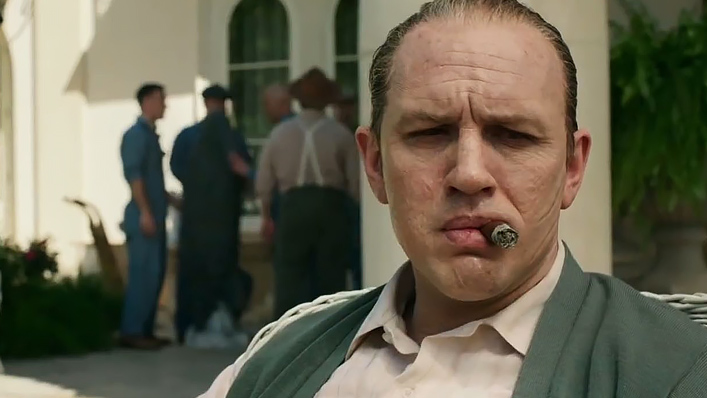Capone is a disgustingly audacious biopic with a wild performance from Tom Hardy

Skipping cinemas and arriving directly on digital, Capone is a freakishly wild biopic featuring another face-chewing performance from Tom Hardy. Here’s Luke Buckmaster’s review.
Ever wondered what it would be like to leap inside the skin of a terrible, terrible person and watch them descend into madness during their last dying and dastardly breaths, as they lose control of their bodily functions and inch towards the gates of hell? Me neither. But that is the psychological essence of writer/director Josh Tank’s grotesquely imaginative and morbidly compelling biopic about the final, dementia-riddled days of notorious gangster Al Capone, who is brought to agonizing life by Tom Hardy in another of the actor’s volcanic displays of alpha masculinity: the face-chewing theatre of Bronson, Bane and Rockatansky.
Capone certainly looks like he’s on death’s door: face blotchy and cheeks scarred by slashes; sweat oozing from his pores; skin a seasick offwhite; forehead contorted in perpetual snarl; chewed up cigar dangling from his mouth. And those eyes, man, those eyes. Red and tired and torn, they look like they’re swelling from somewhere deep within. Tank’s cameras linger uncomfortably close throughout the film, as if compelled by his scent. Hardy’s fascinatingly intense performance is the smelly adhesive binding together what often feels like a kind of bizarro revue or series of twisted vignettes: a biopic by way of a sideshow, based in the last year of the gangster’s life as he is losing his mind.
In the opening moments the protagonist is shown stomping around the house with a hot iron—checking the wardrobe, it seems, for intruders, but instead finding a young girl. Fake out: this is a game of hide and seek! When mirthful children flock around him, I feared Capone would become one of those ‘humanizing’ biopics pushing a message that hey, the arsehole in question was actually a decent bloke if you got to know him.
It isn’t; perhaps Tank’s greatest achievement is depicting a desperately sick and dying man and not having us feel sorry for him one iota. Depictions of intense incontinence helps (what Malcolm Tucker would call “arse spraying mayhem”), as do fantasies in which Capone runs around mowing people down willy-nilly, in one scene with a bright gold tommy gun, the end of a carrot jammed into his mouth (a healthy alternative to a cigar). All that’s missing from this hideous cartoon is an exclamation of “what’s up Doc?”

At one point Capone calls up the police, in bed at night, blabbering gibberish about where he lives, before excusing himself to venture down into his basement. As you do, as you do. He discovers himself transported to somewhere in the recesses of his crumbling mind, into a room holding a fancy dress soiree, where a spotlight is pointed on his face and a performer on stage croons Blueberry Hill. Then dozens of grey balloons fall from the ceiling. What the hell is going on?
This is the scene that makes explicit what we assumed all along: that this film is about descent into madness, the slobbering pasty yeti of a man ravaged by internal horror. It is a romantic way of looking at villainy: the idea the wicked pay a final price for their awfulness, tortured by the sins of the past. You could make a very different point in the exact same setting as Capone: about a wealthy elite in a mansion who slumps around next to his lovely garden, tendered for and fussed about in his final days, receiving undeserved care and attention while in the lap of luxury.
Attention is drawn to this when an FBI agent (Jack Lowden) impresses upon a superior the need to pursue Capone, saying: “Do you know what the difference is, sir, between Adolf Hitler and Al Capone? Hitler’s dead. Capone lives like a king in Florida”. Tank’s script acknowledges the perversity of this situation, only to revert to that romantic, falsely reassuring view of justice by way of self-inflicted psychological comeuppance.
Trying his best to sound philosophical, the agent adds: “All I know about a man who spends his entire life lying to everyone about everything…rots in there”, putting to his chest with his index finger. As if to say: the long arm of the law might not have been able to properly reach this guy, but violation of a moral compass will cause him no end of pain. Oh please. What a lot of tosh. Most bad guys (in real-life and in the movies) don’t even realise they’re the villains, let alone have the decency to be tormented by their own creations.
I prefer a different scene involving the FBI. Capone himself—sweating and looking dazed and monsterized, with those red, red eyes—is being interrogated, though he barely has the ability to speak and is, shall say, quietly demonstrating what Malcolm Tucker described as a certain kind of mayhem. The gangster’s legal representation interjects and rescues him, saying: “My client has no idea what is going on—or what he ate this morning”. It’s an amusing line, but you can’t laugh. Like the film it’s funny twisted, not funny ha ha.

















